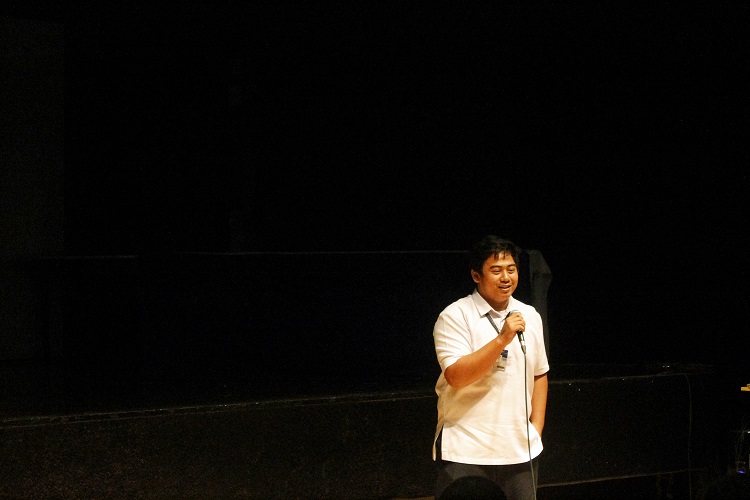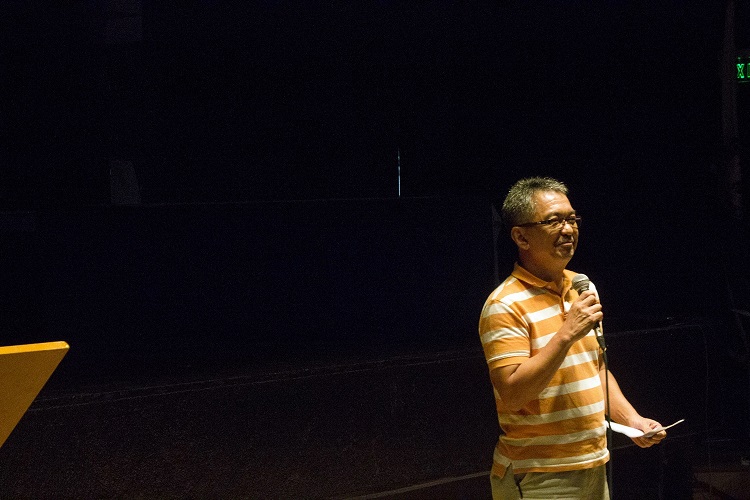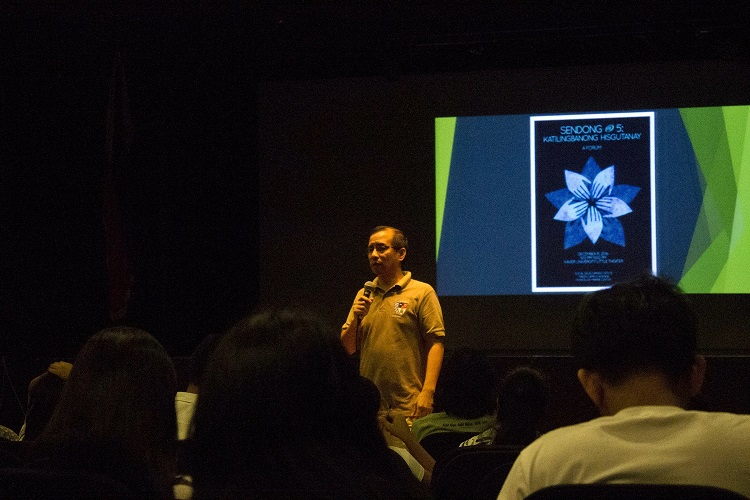
HARD LESSONS. Alexie Colipano Jr, a Sendong survivor and graduating Business Administration student shares his painful experiences and the lessons he has learned from that fateful night in December 2011. Alexie now lives at Xavier Ecoville, an XU-led resettlement community in Barangay Lumbia. Suppied photo.
Report by Nadine Arabelle L Vivares and Glenda S Factura
In commemoration of the 5th anniversary of the Sendong tragedy, Sendong survivors, partner institutions, representatives from the academe, civil society organizations, media, and the city government gathered at the forum titled “Sendong @ 5: Katilingbanong Hisgutanay,” organized by the Social Development - Advocacy Program, McKeough Marine Center and Green Campus Agenda on the afternoon of December 15 at Xavier University Little Theater.
Participated in by more than 200 participants, XU vice-president for social development Roel R Ravanera kicked off the forum by recounting the deluge of Sendong on the late night of December 16 and early hours of 17th. He said that may the Sendong tragedy serve as a lesson for Kagay-anons to reconcile with nature and build more climate change-resilient communities.
XU Engineering Resource Center founding director and engineering faculty member Engr Dexter S Lo presented his study “Mapping the Sendong Story: Science, Signs, and Insights,” detailing the technical factors on why and how Sendong happened, as well as what we could do to prevent it from happening again.
Brief and emotional recollections of Sendong survivors from CDO and Iligan City also dotted the forum. Stories were heard from Alexie Colipano Jr, Sendong survivor and a graduating student of XU Business Administration; Achmad S Musa, head of an organization of Iligan survivors; Mary Kris Gebe of Kuya Fish Campaign; and Alexie Colipano Sr, president of the Xavier Ecoville Homeowners Association (XEHA).
Individuals from partner organizations who helped during the aftermath of Sendong also shared their stories and experiences: Ercel Maandig of the media group Mindanao Media Advocates for Environmental Preservation (MMAEP); Sabrina Balais, area manager of Balay Mindanaw Foundation Inc; and Lerma Bernadette Reyes, program manager for Habitat for Humanity Philippines - Cagayan de Oro.

RECONCILIATION WITH NATURE. XU vice-president for social development Roel R Ravanera recounts the deluge of Sendong on the late night of December 16 and early hours of 17th. He says that may the Sendong tragedy serve as a lesson for Kagay-anons to reconcile with nature and build more climate change-resilient communities. Supplied photo.
Towards the end of the program, Engr Ermin Stan Pimentel, city hall consultant for the Shelter and Housing Development Multisectoral Task Force, spoke and answered some questions on behalf of CDO Mayor Oscar Moreno.
Engr Pimental shared that before Sendong, “wala sa atong kasinatian ang typhoon speed 1, 2, 3 kay nagtuo kita nga dili ta maagian og bagyo.” After the Sendong tragedy struck, “nausab na ang panghuna-huna sa mga tawo, gakalimtan na ang Simbang Gabi kay ang bagyo na ang mahinumduman,” he added.
As an observation, he shared that “at the height of disaster, what’s good and beautiful, in the midst of this mess, makita kung unsa ka maayo magtinabanga.”
The lessons learned by the LGU on the aftermath of Sendong included the institutionalization of the CDO Disaster Risk Reduction Management Council (CDODRRMC) and Local Urban and Housing Development Program (LUHDP).
Pimentel advised that the city government needs to procure lands, since there are still 2,400 households without relocation five years after Sendong. He also stated that the next steps of the city include to facilitate stabilization especially in the relocation of the displaced and illegal settlers, and to provide employment opportunities and livelihood mechanisms.

MOVING FORWARD. Engr Ermin Stan Pimentel, city hall consultant for the Shelter and Housing Development Multisectoral Task Force, says that the city government and its partner institutions must find more ways to provide permanent homes to some 2,400 families who are still living in bunk houses of different relocation areas. Supplied photo.
Five years after the Sendong tragedy, Xavier University remains steadfast in its commitment to the Sendong survivors grounded in the Jesuit mission of “care for others (cura personalis) and seeking God in all things.”
In early 2012, Xavier Ateneo and the local government established Xavier Ecoville as the resettlement village for the victims of Typhoon Sendong, which rendered thousands of families homeless. Today, Ecoville stands as a testament to the resiliency of the families who survived the calamity. ∎